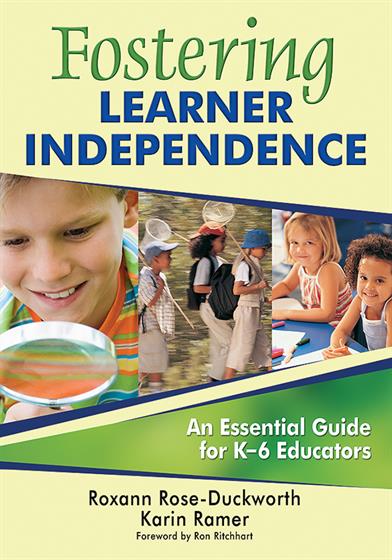Foreword by Ron Ritchhart
Preface
Acknowledgments
About the Authors
1. Learner Independence
Defining Learner Independence
Learner Independence Encourages Self-Esteem
Independent Learning: A Habit of Mind
Conclusion
A Time to Reflect
A Visit to Our Classrooms
2. Structuring for Learner Independence
Controlling Versus Structuring for Learning
Fostering Independence Through Student Thinking
Interdependence Encourages Independence
Conclusion
A Time to Reflect
A Visit to Our Classrooms
3. Teaching That Promotes Independence
Implicit and Explicit Teaching
Constructivist Education
Supporting Students: The Zone of Proximal Development
Problem-Based Instruction
Gradually Releasing Responsibility
Conclusion
A Time to Reflect
A Visit to Our Classrooms
4. Expectations and Communication That Supports Independence
Benefits of a Well-Managed Classroom
Setting Expectations
Communicating With Students
Language of the Classroom
Peer Communication
Conclusion
A Time to Reflect
A Visit to Our Classrooms
5. Aligning Understandings and the Environment for Independence
Benefits of a Well-Planned Environment
An Environment That Mirrors a Teacher's Understandings
Analyzing the Physical Environment
Role of the Teacher
Conclusion
A Time to Reflect
A Visit to Our Classrooms
6. Setting Up for Independence
Arranging the Physical Environment
Whole Group
Small Group
Student Seating
Student Seating: The Freedom to Choose
The Teacher's Desk
Learning Centers, Materials, Supplies, and Resources
Wall Space
A Final Touch
Routines and Procedures
Change Over Time
Conclusion
A Time to Reflect
A Visit to Our Classrooms
7. Assessment That Fosters Independence
A Comparison of Assessments
The Link Between Rubrics and Independence
Assessment That Encourages Independence and Creativity
Assessing With Purpose
Reflect on Your Use of Rubrics
The Benefits of Assessment for Learning
Conclusion
A Time to Reflect
A Visit to Our Classrooms
8. Evaluation and Analysis That Develops Independence
Supporting Students Through Evaluation
Using Evaluation in Planning
Conclusion
A Time to Reflect
A Visit to Our Classrooms
9. Information That Fosters Learner Independence
Observations as Assessment
Conversations as Assessment
Feedback: Descriptive and Evaluative
Feedback That Informs Instruction
Analyzing Student Work for Evidence of Instruction
Analyzing With Others
Conclusion
A Time to Reflect
A Visit to Our Classrooms
10. Planning to Support Independence
Purposeful Decisions
The Teaching and Learning Cycle
Long-Range Planning
Daily Planning
Approaches, Grouping, and Resources
Conclusion
A Time to Reflect
A Visit to Our Classrooms
11. Differentiating for Independence
All Students Can Learn
Teaching Responsively Encourages Independence
Using a Variety of Processes and Resources to Encourage Independence
Go Deep, Avoid Coverage
Students Need to Know Themselves as Learners
Student Choice Is Critical
Differentiation Leads to Independent Learners
Conclusion
A Time to Reflect
A Visit to Our Classrooms
12. Conclusion: Changing and Reflecting
Our Behaviors Are Influenced by Thought and Perception
Teaching Is Constant Decision Making
Learning Requires Engagement and Alteration in Thought
Humans Continue to Grow Cognitively
Resource A: Task Analysis
Resource B: Moving From Controlling Learning
Resource C: Responses That Encourage Independence
References
Index



